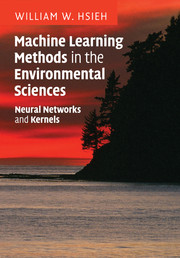Book contents
- Frontmatter
- Contents
- Preface
- List of abbreviations
- 1 Basic notions in classical data analysis
- 2 Linear multivariate statistical analysis
- 3 Basic time series analysis
- 4 Feed-forward neural network models
- 5 Nonlinear optimization
- 6 Learning and generalization
- 7 Kernel methods
- 8 Nonlinear classification
- 9 Nonlinear regression
- 10 Nonlinear principal component analysis
- 11 Nonlinear canonical correlation analysis
- 12 Applications in environmental sciences
- Appendices
- References
- Index
4 - Feed-forward neural network models
Published online by Cambridge University Press: 04 May 2010
- Frontmatter
- Contents
- Preface
- List of abbreviations
- 1 Basic notions in classical data analysis
- 2 Linear multivariate statistical analysis
- 3 Basic time series analysis
- 4 Feed-forward neural network models
- 5 Nonlinear optimization
- 6 Learning and generalization
- 7 Kernel methods
- 8 Nonlinear classification
- 9 Nonlinear regression
- 10 Nonlinear principal component analysis
- 11 Nonlinear canonical correlation analysis
- 12 Applications in environmental sciences
- Appendices
- References
- Index
Summary
The human brain is an organ of marvel – with a massive network of about 1011 interconnecting neural cells called neurons, it performs highly parallel computing. The brain is exceedingly robust and fault tolerant. After all, we still recognize a friend whom we have not seen in a decade, though many of our brain cells have since died. A neuron is only a very simple processor, and its ‘clockspeed’ is actually quite slow, of the order of a millisecond, about a million times slower than that of a computer, yet the human brain beats the computer on many tasks involving vision, motor control, common sense, etc. Hence, the power of the brain lies not in its clockspeed, nor in the computing power of a neuron, but in its massive network structure. What computational capability is offered by a massive network of interconnected neurons is a question which has greatly intrigued scientists, leading to the development of the field of neural networks (NN).
Of course there are medical researchers who are interested in how real neural networks function. However, there are far more scientists from all disciplines who are interested in artificial neural networks, i.e. how to borrow ideas from neural network structures to develop better techniques in computing, artificial intelligence, data analysis, modelling and prediction. In fact, neural network methods have spread beyond medicine and science into engineering, economics and commerce.
Information
- Type
- Chapter
- Information
- Machine Learning Methods in the Environmental SciencesNeural Networks and Kernels, pp. 86 - 112Publisher: Cambridge University PressPrint publication year: 2009
Accessibility standard: Unknown
Why this information is here
This section outlines the accessibility features of this content - including support for screen readers, full keyboard navigation and high-contrast display options. This may not be relevant for you.Accessibility Information
- 3
- Cited by
